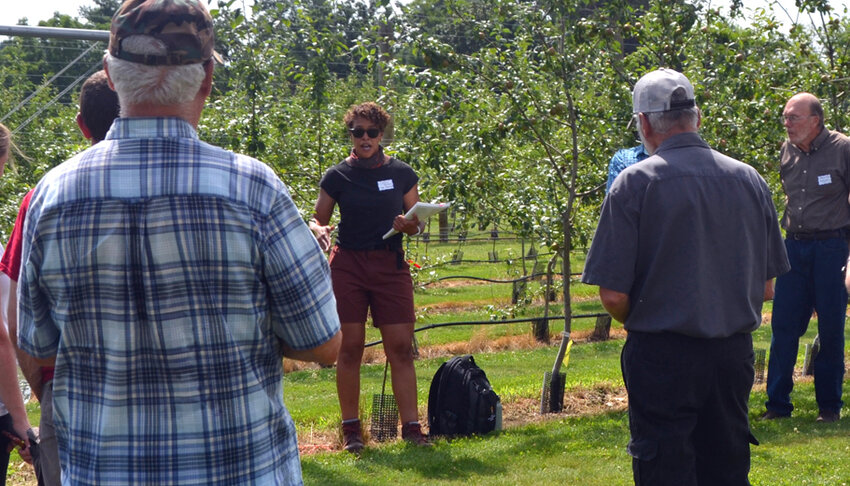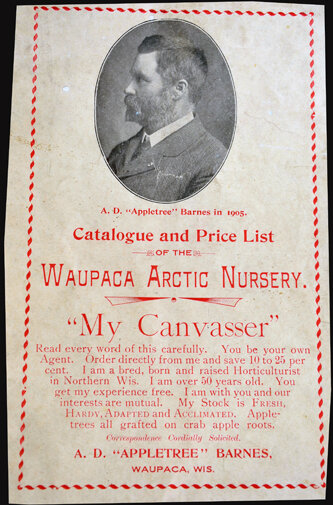
James Card Photo
By James Card
Just off State Highway 54 near the Chain Exploration Center, there is an apple orchard that produces apples that few people have ever heard of and would not want to eat. That is by design.
For orchard owner John Sturm, his plan is all coming together after years of work.
His apple trees are for making cider and cider apples do not taste like the ones at the grocery store. They are bitter and their tannins are different but that makes for good hard cider, the kind that Ben Franklin and Thomas Jefferson liked to knock back.
“The analogy I would use is from the wine world: you don’t make world-class wine with Concord grapes. That’s for jelly or grape juice. You need cabernet or merlot. So what I’m growing is the cabernet and merlot of the apple world, which would be apples you’ve never heard of, like Dabinett, Chisel Jersey, Bulmer’s Norman. Nobody has heard of these apples because they are only for making cider,” said Sturm.
Sturm grew up in Manawa and during summers he captained the Chief Waupaca sternwheeler. While cruising the Chain O’ Lakes, there was one property he had his eye on and when it came up for sale he bought it in 1999. Behind that property was an abandoned dairy farm and he was eventually able to acquire that. He planted his first apple tree there in 2014.
“I decided I wanted to make hard cider. I did some reading that hard cider was the original beverage of our founding fathers. Before there was beer or anything, they were making hard cider. Years later, prohibition wiped out cider and all the cider trees were chopped down and later the world shifted to beer and spirits and wine. Because who wants to take seven or eight or nine or ten years to re-grow these trees?” said Sturm.
He planted a test orchard in 2018. In 2021, he planted what he calls the “big orchard” and he applied everything he learned from his test orchard and scaled it up. He has a high-density orchard that uses the tall spindle system. It’s hedgerows of dwarf apple trees that make production easier. They grow along trellises and it looks more like a vineyard than an orchard.
He collected and planted apple trees that the forefathers used for cider: Campfield, Granniwinkle, Harrison and Hewe’s Crab to name a few.
“This opens up a Pandora’s box of any possibility: pears, apples, combinations of grapes and apples, combinations of maple syrup and honey. All these things are possible. Our forefathers used to do them all because they worked with what they had. And then those things got lost in time and we’re bringing back those original drinks,” said Sturm.
He named his orchard Red Sky Cider & Wine and it now holds 5,000 apple trees plus a mix of pear trees and rows of Marquette grapes—a type developed for northern climates,
On July 9, Sturm hosted the Wisconsin Apple Growers Association. It was their annual Field Day and approximately 80 apple growers from around the state converged to tour his orchard and attend lectures in the field from UW-Madison scientists. They learned about thinning strategies, managing wasps and Japanese beetles, dealing with fire blight, the legalities of producing hard cider and best practices for irrigation.
For Sturm, this was a professional milestone to host his peers and be recognized for his work and expertise. It is also a time where he is almost ready to share the fruits of his labor with the public.
“I’ve got to the point where I have so much fruit and I’m ready to commercialize. What I need to still build a commercial production facility. Everything will be estate-grown. Everything I make here will come out of this soil,” he said. Red Sky will bottle and sell Marquette wine, hard cider and perry, a pear cider.
He’s made cider, perry and wine for four years in a row and has been perfecting his recipes. He has a walk-in cooler where beverages ferment in stainless steel vats and oak barrels. Right now he is producing 500 gallons for further testing. Friends and family give him feedback.
One source of feedback was from the community. After the Covid pandemic, the Waupaca Chain Skiers needed some help getting back on their feet. They lost members and were not allowed to do shows at the Wisconsin Veterans Home. Last year Sturm hosted a tasting and barbecue event at the orchard. It was a success: he was able to raise funds for the team and people got to try his ciders.
“One problem with this category of super-premium cider is that no one has tasted it before. If you buy hard cider at the liquor store you will get a mass-produced beverage that tastes like alcoholic apple juice. This does not taste like apple juice; it tastes more like champagne with a bit of a nose for apple. The flavor is really dry and it’s not sweet at all. It’s going to take a while to educate people and get their reactions and feedback,” said Sturm.

James Card Photo
The day after the Wisconsin Apple Growers convened in Waupaca, Bruce and Karen Barnes drove up from the Mequon area to meet Henry Jacobson, a local apple tree historian who rediscovered the rare Ratzburg apple tree in 2016.
The met at the Apple Tree Lane Bed & Breakfast and Karen Barnes presented Jacobson with a sheaf of historical documents about Asa Darius “Appletree” Barnes, her husband’s great grandfather.
Barnes was born in Dodge County in 1852 in a “timbered wilderness, with bears, wolves and Indians for associates” according to a mimeographed biography. He tried a stint at homesteading in Nebraska before he settled in Waupaca in 1885 to become the areas foremost apple grower.
“He was told this was too far north for apples so he named his orchard Arctic Nursery to stick it to them. He was, shall we say, very good at self-promoting,” said Karen.
Jacobson noted that during the time when Barnes was operating his nursery, Waupaca County was one of the top apple-growing regions in the state.
After studying some old photos, Jacobson surmised that when U.S. Highway 10 was constructed many of the apple trees were cut down. Some trees still exist but they are newer, not ones planted by Barnes.
Like Sturm, Barnes grew apple trees with names now unfamiliar: Berlin, Lindfield, Sweet Fameuse and Red Jacket. In his catalogue, Barnes wrote the Red Jacket was given the name by the Waupaca Area Horticultural Society and noted, “This apple was blessed and christened as a child by Rev. Geo. White.”